
For the United Farm Workers and its allies on Capitol Hill, the failure of the Farm Workforce Modernization Act (FWMA) was a defeat for their campaign to win legal immigration status for undocumented field laborers.
Teresa Romero, UFW President, called it «a very bitter disappointment for farm workers across the country who have more than earned the right to legal status through the sweat of their brow.» She blamed the American Farm Bureau for withholding its support. «They know that an undocumented workforce is easier to intimidate and exploit,» she charged.
«This bill was not perfect and included difficult compromises, but it provided meaningful relief for farmworker families,» said a statement from DC advocate Farmworker Justice, which called Congress’s failure to pass it «inexcusable.»

When the FWMA failed, however, many farmworker organizations outside the Washington, D.C., Beltway felt they’d dodged a bullet. They saw in the bill a boost to the H-2A temporary guestworker program in agriculture, accompanied by immigration enforcement intended to drive undocumented workers from the fields. For Edgar Franks, political director for Familias Unidas por la Justicia, a Washington State farmworker union, «this bill was a gift to growers and gave them things they’ve always wanted. We’ve been speaking out against it for three years-time we should have been able to spend organizing workers-because of the threat of E-Verify and the growth of the H-2A program.»
The bill passed the House two years ago, but got stuck in the Senate, where Republicans refused to support even a torturous process for granting legal status to some undocumented farmworkers. Facing Congress’s adjournment, Colorado Democratic Senator Michael Bennet reintroduced it as the Affordable and Secure Food Act, with more favorable provisions for growers. In a last-minute Hail Mary after failing to obtain a Senate vote on it, the bill’s supporters tried to attach it to the omnibus spending bill. That didn’t work either, and the bill finally died.
Neither the FWMA’s advocates nor its opponents expect that the next Congress, in which right-wing Republicans will dominate the House, will vote for any measure to provide legal status to people without papers, even as a tradeoff for other anti-immigrant or anti-worker provisions. In the wake of its defeat, many activists now call for reassessing the decades old strategy of trading legal status for undocumented immigrants for increased enforcement and guestworkers. Avoiding this tradeoff, they believe, depends on farmworkers having greater political and economic power, and virtually all agricultural unions and workers centers agree that organizing is the key.

Ignoring the roots of migration
The FWMA compromise was specific to agriculture, but its general architecture reflects the comprehensive immigration reform proposals of the past two decades. In all these grand compromises, legalization is traded for increased enforcement against the undocumented and immigrant labor programs desired by employers.
This tradeoff strategy was set in place in 1986, with passage of the Immigration Reform and Control Act. That bill provided amnesty for about 3.5 million undocumented people, gave farmworkers a separate legalization program, resurrected a labor visa system from the bracero era, began the process of militarizing the border, and made it a crime for employers to hire undocumented workers.
The 1986 amnesty gave people legal status in a relatively short time, and didn’t condition it on their willingness to work in low-wage jobs. Later tradeoff proposals, however, began treating legal status as a privilege that had to be «earned,» rather than a way to ensure people’s rights and their integration into the communities around them. Supporters of the tradeoff strategy argued that a combination of «earned» legalization and ferocious enforcement against migrants crossing the border, while prohibiting their ability to work, would deter further migration.
Under such policies, however, the number of Mexican migrants in the United States actually increased from about 4.6 to 12.5 million. That flow of people seeking survival continues today. «We need to address the role the US has played in displacing people through free trade agreements and neoliberal economics,» says Edgar Franks.

What went wrong with «earned» legalization
Immigration reform based on providing the labor of migrating people to employers to win their political support, while agreeing to anti-immigrant enforcement to win right-wing votes, never addressed the root causes of migration. The idea of «earned» legalization was intended to create an image of deserving immigrants, but it obscured the true reasons for their presence in the United States. At the same time it made migrants more vulnerable.
Myrna Martinez, director of Fresno’s Pan Valley Institute, affiliated with the American Friends Service Committee, proposes instead an immediate and inclusive amnesty, that legalizes all undocumented people. «The nearly 2.4 million farmworkers in our community have already ‘earned’ a pathway to citizenship through decades of work and contributions to their communities and the US,» she says. Expanding the H-2A visa program and creating a temporary status for workers applying for legalization, she charges, «ignores the experiences of past and present guest workers that have been characterized by extreme exploitation and abuse akin to human trafficking.»
A flawed political strategy has produced these failed tradeoff compromises, and the immigrant rights movement has been deeply divided over them. They are proposals crafted by groups sitting around a table in Washington, D.C., not ones emerging from broad discussions among immigrant and worker groups. In a hostile Congress, the compromises are crafted to get votes from legislators who owe allegiance to employers, who want controlled labor at the lowest possible price. In this process the enforcement lobby, with its stake in detention and border militarization, wields tremendous power.
«From the inception the negotiations over the FWMA weren’t transparent and inclusive of other farmworker organizations or unions,» Franks says. Instead, immigrants and workers are shut out of negotiations, and then presented with a bill as a fait accompli. The tradeoff is treated as the only way to win legal status, which is the only goal, and an increasingly distant one.
MORE THAN A WALL/MAS QUE UN MURO
Exhibition at University of Texas
David Bacon
Moody Fellow Professional-in-Residence
January 24, 2023, 6:30PM
Exhibition, reception, book signing
DMC 5.102
WHY FARMWORKER LEGALIZATION FAILED
The Farm Workforce Modernization Act’s failure to become law reveals critical divisions within the immigrant rights movement.
By David Bacon
The Nation, 1/10/23
https://www.thenation.com/article/activism/farmworker-legalization-failed/
https://davidbaconrealitycheck.blogspot.com/2023/01/why-farmworker-legalization-failed.html
